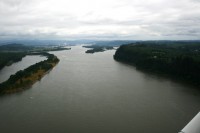The Port of St. Helens granted lease options to two coal companies Jan. 25, despite overwhelming testimony opposing the coal terminals. The City of Rainier stated that coal trains would split their town in half and have a devastating effect on local businesses.
Vance Fraser, who lives in Clatskanie near the proposed coal terminal, stated, "I heard a lot of good reasons why this project shouldn't go forward, including the rail issues, and it's clear that the commissioners were just going through the motions and had their minds made up. The worst of it is that people who are impacted didn't even know that a decision was going to be made."
The Port has kept the coal plans secret for over a year, and refused to respond to public records requests. Apparently, the Port already had lease agreements drafted prior to informing the public about the possibility of coal projects.
“This was a deal made behind closed doors,” stated Brett VandenHeuvel, Executive Director of Columbia Riverkeeper.
In an interview with the Oregonian regarding coal exports, Governor Kitzhaber indicated that development of a terminal "should not happen in the dead of night," and that "we must have an open, vigorous public debate before any projects move forward."
Unfortunately, the Port of St. Helens Commission meeting proves a trend of secrecy that companies like Ambre and Kinder Morgan are pushing. Oregon decision-makers ought to respond by daylighting the debate around coal exports, and standing up for all Oregon communities that would be affected by the health and safety hazards, and risks to our air and water posed by coal exports.
“From cradle to grave, coal is a dirty and dangerous commodity,” said Laura Stevens, organizer with the Sierra Club’s Beyond Coal Campaign. “Oregonians have made great strides in embracing clean energy development, but companies like Kinder Morgan and Ambre Energy want to keep our communities tied to a future with coal that damages our health, and fouls our air and water.”
“Dirty coal and disruptive coal trains will harm the health and local businesses of every community along the rail,” stated Brett VandenHeuvel. “There would be schools, hospitals, and businesses literally on the wrong side of the tracks, blocked from accessing the highway.”
The first lease is with Kinder Morgan to use Port Westward as a coal export terminal. An unspecified volume of coal would be shipped via rail from the Powder River Basin, through the Columbia River Gorge and Portland to Port Westward, near Clatskanie, Oregon. The small Portland and Western Railway from Portland to Port Westward passes directly through the cities of Scappoose, St. Helens, and Rainier.
The second lease agreement is with Ambre Energy to operate a transloading terminal at Port Westward. Ambre would ship coal via rail from Powder River Basin to the Port of Morrow, load barges full of coal, and transfer coal to ships in the Columbia River Estuary at Port Westward.
Coal pollution is toxic and contains mercury, arsenic, and lead. Coal dust is associated with lung disease and increased asthma. Other lower Columbia River ports, such as Portland, Vancouver, Woodland, and Kalama, have rejected coal export terminals.
More information about the impacts of coal export see powerpastcoal.org.



